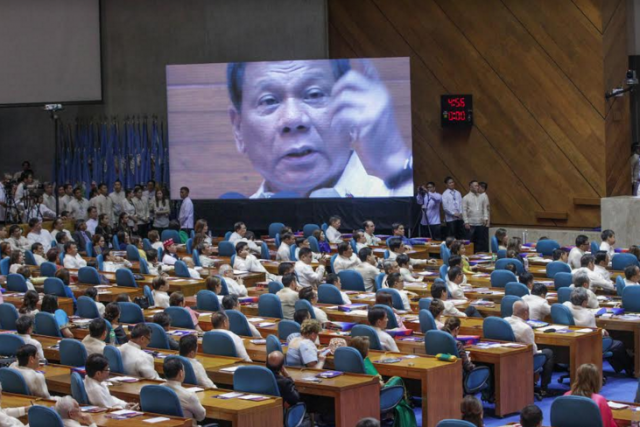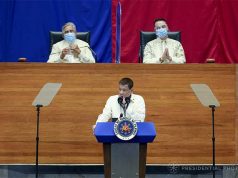
MANILA, Philippines – Saying it’s a cause of great distress, President Rodrigo Duterte during his State of the Nation Address (SONA) decried the non-implementation of the Reproductive Health (RH) Law for almost the last five years because of a ruling issued by the Supreme Court.
“‘Yang TRO na ‘yan [That temporary restraining oder] has been the bane of our efficiency. And I really do not know, I will not attribute anything Ma’am sa [to the] Supreme Court,” said Duterte, apparently referring to Chief Justice Maria Lourdes Sereno, who was among the ranking officials present during the chief executive’s second SONA at the Batasang Pambansa in Quezon City.
“Maybe I am at fault, so I am sorry if I misquote or I do not have the complete facts. But itong [this] Congress na ito passed the reproduction law. It was already a law na dapat i-implement [that should be implemented] because we (are) really going into a family planning,” he added.
As pro-life and pro-choice advocates continue to argue over the law, Duterte clarified on Monday that, “I am not for abortion. I am not for birth control. But certainly I am for the giving of the freedom to the Filipino family to decide (the size) ng pamilya n’yo [of your family].”
While the high court earlier clarified that there was no TRO on the law itself and that the direct injunction was only on contraceptive implants, such as Implanon and Implanon NXT, Duterte complained that the high tribunal’s ruling nevertheless derailed the legislation’s implementation because it made the certification, procurement, and access to contraceptives more difficult.
In June 2015, the high court barred the Food and Drug Administration (FDA) from granting pending applications for registration and or re-certification of reproductive contraceptive drugs and products and ordered the agency to certify whether or not contraceptives in the country are safe, efficacious and not abortifacient.
Duterte said the high court’s ruling would result in the wastage of contraceptives worth millions of pesos that were bought by the government supposedly in compliance with the RH Law as these would expire next month.
“In the meantime, ang gobyerno nagbili ng medisina itong subdermal (implants) pati itong mga [the government bought medicines, these subdermal implants including these] pills worth P360 (million). It was not really a reckless purchase. It was in preparation for the implementation of the law,” the President said.
“I told (Paulyn) Ubial, the Health Secretary, to find out if there is a nation which would allow it and to donate it rather than go to waste,” he added.
A TRO was sought by the Alliance for the Family Foundation, Philippines to stop the procurement and distribution of hormonal contraceptives Implanon and Implanon NXT. The organization claimed that these two were abortifacients. The Supreme Court granted the group’s plea in June 2015.
The Office of the Solicitor General then filed a motion to lift the TRO, which the Supreme Court denied in August 2016.
Supreme Court spokesperson Theodore Te clarified that there was no TRO against the law.
But, he said, citing the August 2016 decision that “the lifting of the TRO on the contraceptives has been remanded to the Food and Drugs Administration, which is hereby ordered to observe the basic requirements of due process by conducting a hearing, and allowing the petitioners to be heard, on the re-certified, procured, and administered contraceptive drugs and devices, including Implanon and Implanon NXT, and to determine whether they are abortifacients.'”
The Commission on Population explained that this meant the Department of Health and the FDA were prohibited from registering and re-certifying contraceptives.
“As a result, fifteen certificates of product registration expired last 2016, while ten expired as of May this year, leaving only 23 contraceptives available for the public,” the commission said in a statement.
“By 2020, no contraceptives can be procured from the market. As such, CPR expirations will effectively lead to a total phaseout of family planning (FP) commodities in the market before 2020. Without FP commodities, the Philippines’ national Family Planning program will effectively be put to a halt,” it added.
The commission sounded the alarm on the krisis ng matris (crisis of the womb) and sought the lifting of the TRO on the contraceptives.
Along with men and women from the urban poor sector, the agency turned over a petition signed by over 300,000 women to the Supreme Court asking it to lift the TRO.
“The lifting of the TRO will also pave the way for the full implementation of the 2012 Responsible Parenthood and Reproductive Health (RPRH) Act that has been deemed by civil society organizations and the population and development sector as dysfunctional for five years,” the commission said.
“The RPRH Law guarantees universal access to all methods of modern contraception, comprehensive sexuality education, and maternal and child care. With the TRO in place, unintended pregnancies may rise which may result to induced abortion and maternal deaths,” it added.









